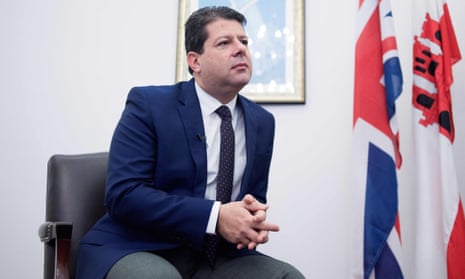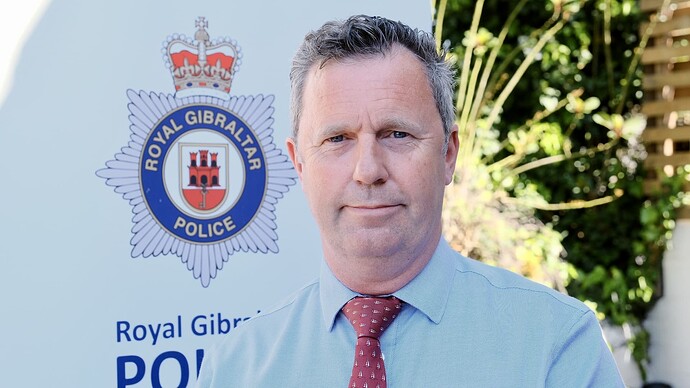• GSD says criticism must not be silenced
The Gibraltar Government on Thursday said the McGrail Inquiry must be allowed to run its course without becoming a “gladiatorial contest of allegations”.
In a statement, No.6 Convent Place said it was unfair that government parties in the Inquiry should be subjected to “premature, unsubstantiated, untested and undetermined allegations” during procedural sessions and before the full hearing of the Inquiry had commenced.
The statement prompted a reaction from the GSD, which agreed that the Inquiry must be allowed to do its work and that the allegations made “are so far unproven”.
But the GSD said too that the serious issues at the heart of the process should be “completely ventilated” without any attempt to “put a lid on issues”.
No.6 Convent Place was reacting in the wake of the recent session of the public Inquiry, which is tasked with probing the reasons and circumstances leading to Mr McGrail’s controversial early retirement in June 2020, after a 36-year career and halfway through his term in the top post at the Royal Gibraltar Police.
During that session, lawyers for Mr McGrail told the Inquiry that the Chief Minister and his legal team had “threatened” former police Commissioner Ian McGrail and his lawyers with potential defamation action in a bid to “gag and silence” their submissions.
At the time, Caoilfhionn Gallagher, KC, a UK barrister representing Mr McGrail, said “we deprecate that approach in the strongest terms”.
“We consider it to be both inappropriate and continuing intimidatory and victimising conduct,” she told the Inquiry.
Sir Peter Caruana, KC, the barrister representing the government parties, immediately refuted that position and insisted “there is no threat”.
The Chief Minister, he said, had only reserved his rights as provided in law, adding that the position had been expressed in the context of “objectionable material” that the parties had finally agreed should not be published at this early stage in the Inquiry process.
Sir Peter Openshaw, the retired UK judge in charge of the Inquiry, left no doubt that he was concerned about the development and said “the threats of defamation were misplaced”.
“People must be allowed to make their submissions and witnesses must not be deterred from giving evidence or making submissions to the Inquiry, and as I say, I regret that that threat was made,” he said at the time.
The exchanges in the Inquiry prompted coverage in the UK press and criticism of the Gibraltar Government’s stance.
In an article published two days after the session, Mark Stephens, co-chair of the International Bar Association’s Human Rights Institute, told The Guardian: “Lawyers should be free to represent their clients without fear of being personally sued for defamation.”
“It is disappointing and an affront to human rights to see this tactic being used by the government of a British overseas territory against UK and Gibraltar lawyers.”
On Thursday, No.6 Convent Place sought once again to reaffirm its position.
In a statement, it stressed that it was the Gibraltar Government that had convened the public Inquiry and that it had given a commitment to publish its report.
No.6 said Sir Peter Openshaw should be allowed to investigate and report on his findings in a fair and independent manner as per the terms of his appointment.
Reflecting exchanges heard during procedural sessions of the Inquiry, No.6 Convent Place said Mr McGrail and his legal team had made “very serious allegations” of personal wrongdoing against the then interim Governor, the Chief Minister and the Attorney General “at every opportunity” and “however procedurally inappropriate”.
“This is despite the Inquiry not having made any finding of facts or wrongdoing, of any kind, that would justify the allegations…which, needless to say, the Government strongly denies and refutes,” No.6 Convent Place said in the statement.
“The Government is conscious that these individuals have rights too, not just Mr McGrail, including the important right to protect their reputations while the Inquiry process takes it course.”
“It is not fair or right, in the context of a statutory inquisitorial inquiry set up precisely to establish the true facts, that these individuals who hold or have held high office in Gibraltar, and indeed Gibraltar as a whole, should be suffering the reputational consequences of premature, unsubstantiated, untested and undetermined allegations of the sort being made by Mr McGrail and his legal team on his behalf.”
“The Chief Minister also has the right and, indeed, the duty to protect the reputation of our jurisdiction from such unproven, mere allegations.”
“The legal team representing Mr McGrail, and those commenting on the subject, should reflect that everyone has human rights, even politicians and senior officials.”
“Protecting their human rights is as fundamental as the protection of the rights of all others.”
“No one involved in this inquiry should think otherwise.”
POLITICAL REACTION
On Thursday, the GSD reacted to the Gibraltar Government statement and agreed that the Inquiry should run its course and be allowed to do its work, and that all parties in the process had rights.
But it said too that the Government “…cannot just deploy the fact that they convened the inquiry as some form of conclusive answer to the issues raised by the Inquiry as if that supported its case that it is blameless and, in some way, immunised the Chief Minister’s handling of the circumstances leading to the departure of the ex-police Commissioner and related issues.”
Keith Azopardi, the Leader of the Opposition, said the Government had been dragged “kicking and screaming” to convene the Inquiry in 2022, after first announcing it on July 31, 2020.
Mr Azopardi said that when it first announced the Inquiry in 2020, the Government had said it would appoint a chairman within “some weeks”, but that the process took a lot longer.
The Government had previously explained that the delay was a result of the pressures of dealing with the Covid-19 pandemic and the Brexit fallout, but the GSD said it should have been a faster process.
“If that had happened the inquiry would have run its course and have concluded a long time ago,” Mr Azopardi said.
“The public are left to wonder whether it was politically inconvenient to convene an Inquiry sooner so that its outcome would not be known till after the next general election.”
“That is a legitimate political comment given the failure of the Government to fulfil its promise to appoint a chairman for the Inquiry ‘quickly’ and within ‘some weeks’.”
“The GSD repeatedly reminded the Government of this after July 2020 and urged the Government to do what it had said it would.”
“In fact, the Government did not appoint the Inquiry till February 2022, almost two years after Mr McGrail had retired.”
“In the meantime, it is within the public domain - because the Chief Minister has said so - that he tried to dissuade the former police Commissioner from persisting with his demand that an Inquiry be held.”
Mr Azopardi said it was “obvious” that there was much for Sir Peter Openshaw to consider and that the allegations being made were “extremely serious”.
“It is correct to say that the allegations made are so far unproven and the chairman should be allowed to do its work,” he said.
“Equally however, the Chief Minister, against whom very serious allegations have been made, cannot expect, given the nature of these, for there not to be any fair comment or to restrain comment on these by defamation ‘threats’ which the chairman of the Inquiry has already described as inappropriate.”
“Nor is it appropriate for Mr Picardo to simply say that he is defending the jurisdiction from reputational damage of allegations he says are denied when in fact he is protecting his own political reputation.”
“The reputation of Gibraltar and his reputation are not the same things.”
“That would be to wrongly conflate issues in the hope of public sympathy for his stance.”
“It is important for democracy that the Inquiry be independent and conducted in full public view so that allegations on all sides can be tested and determined.”
“The outcome of what transpired is for the chairman of the Inquiry.”
“But it would be wrong for the Chief Minister or Government to attempt to silence criticism or put a lid on issues.”
“Given the severity of the issues at stake the reverse is true.”
“They should be completely ventilated and tested one way or the other.”
“That is what would happen in any other democracy.”














